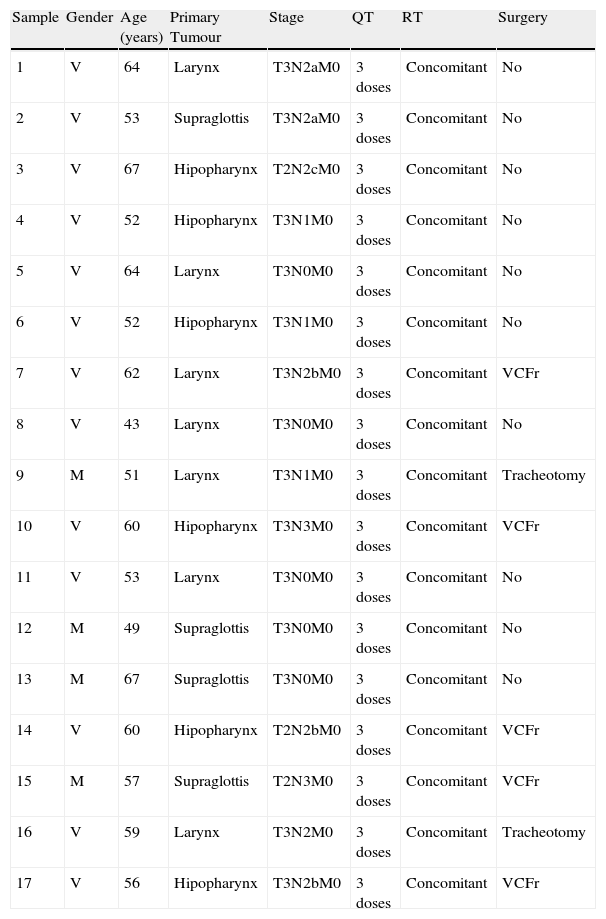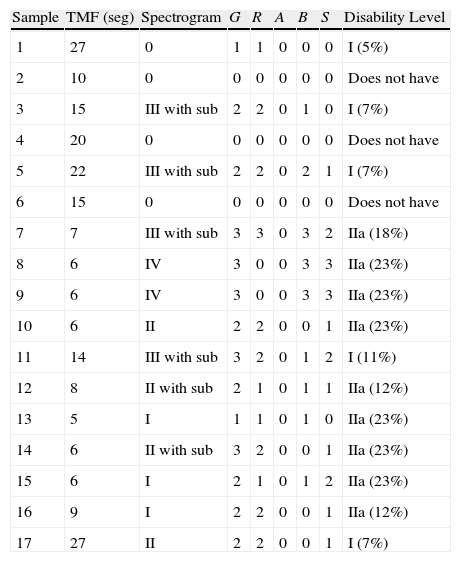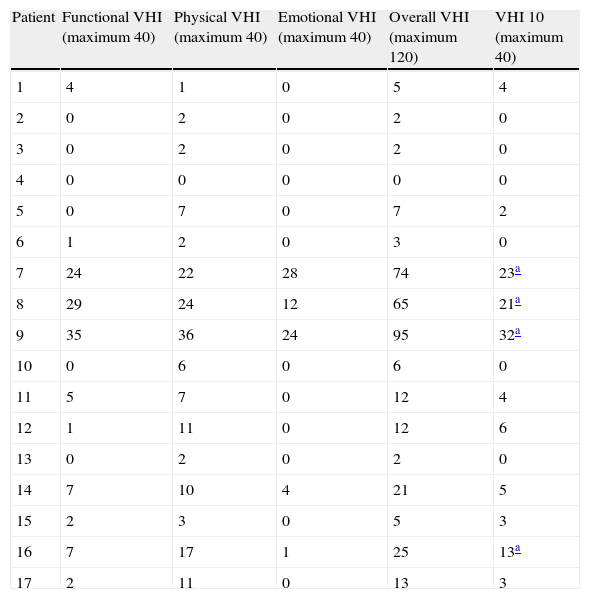Advanced laryngeal and pharyngeal cancer, as well as methods to treat them, have a direct impact on voice function, speech communication and deglutition. Such alterations in function can influence employability and general quality of life.
Patients and methodsTo characterise the vocal status of the patients treated with an organ-preservation protocol, we report the voice outcomes of 17 patients who were alive and disease free at the time of the survey, with a minimum follow-up of 6 months, after a combination of radiotherapy and chemotherapy to treat advanced cancer. Objective voice assessment by means of spectrographic analysis, the GRBAS perceptual analysis system and the Voice Handicap Index was the methodology followed, which we suggest could be used in future large-scale investigations.
ResultsNormal or slightly dysphonic voices were observed in five patients (29.4%) and moderate/severe in 12 (70.6%). Spectrographically, the 17 samples were classified as normal in four cases (23.4%), Grade I in three cases (17.6%), Grade II in three (17.6%), Grade III in four (23.5%) and Grade IV in two (11.7%). The Voice Handicap Index questionnaire, which was completed by the patients themselves, gave normal results in all the patients except for four (23.5%).
ConclusionsThe voice acoustic analysis of this series shows that the damage related to the organ-preservation protocol displays a relatively wide range of voice function outcomes. To characterise the vocal status of these patients reliably, we propose using homogeneous instruments (spectrography, GRBAS scale, maximum phonation time and Voice Handicap Index) in future meta-analyses.
Los carcinomas avanzados de faringe y laringe y los distintos métodos que se emplean para su tratamiento tienen un impacto directo en la función vocal, la comunicación oral y la deglución, alteraciones que pueden influir en la capacidad laboral y en la calidad de vida general.
Pacientes y métodosCon el fin de conocer la salud vocal de los pacientes tratados mediante un protocolo de preservación de órgano presentamos los resultados vocales de 17 pacientes tras ser tratados mediante una combinación de radioterapia y quimioterapia, y que han sido seguidos un mínimo de 6 meses, encontrándose vivos sin evidencia de enfermedad en el momento del estudio. Se realiza una valoración objetiva de la voz mediante espectrografía, análisis perceptual por el sistema GRABS y el Voice Handicap Index como metodología aconsejada, que puede ser empleada en el futuro en estudios más extensos.
ResultadosSe observaron voces normales o levemente disfónicas en 5 pacientes (29,4%), y moderadas/severas en 12 (70,6%). Espectrográficamente, las 17 muestras se clasificaron como normales en 4 casos (23,4%), Grado I en 3 casos (17, 6%), Grado II en 3 (17,6%), Grado III en 4 (23,5%) y Grado IV en 2 (11,7%). Las puntuaciones en el cuestionario Voice Handicap Index se encontraron dentro de los rangos normales en todos los casos, excepto en 4 (23,5%).
ConclusionesEl análisis acústico de la voz de los pacientes de esta serie demuestra que el daño que se produce tras un tratamiento de preservación de órgano causa un amplio rango de resultados vocales. No obstante, la sensación de incapacidad de estos pacientes es mínima. En este estudio se propone el uso de instrumentos homogéneos (espectrografía, GRABS, Tiempo Máximo de Fonación y Voice Handicap Index) para ser usados en futuros metaanálisis.








